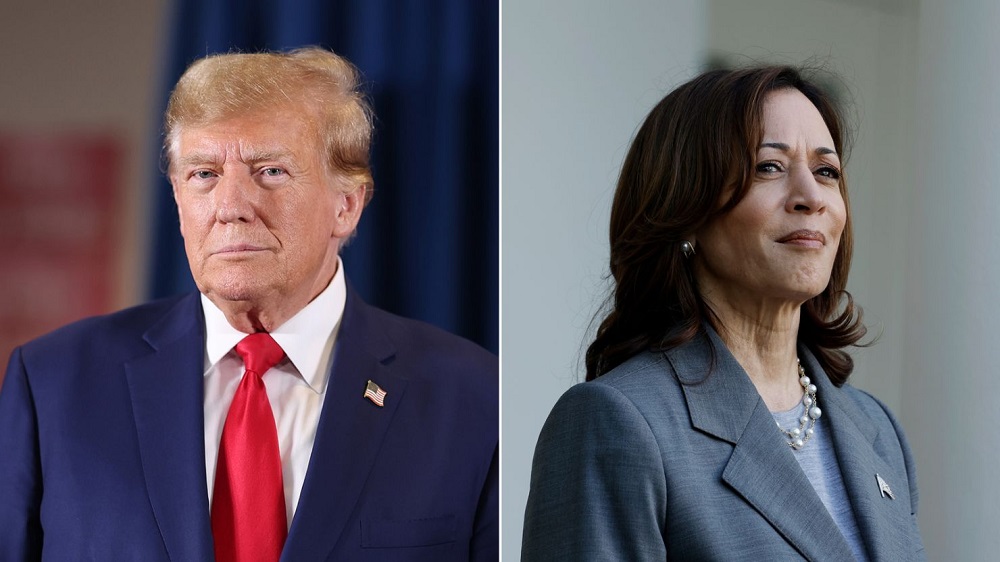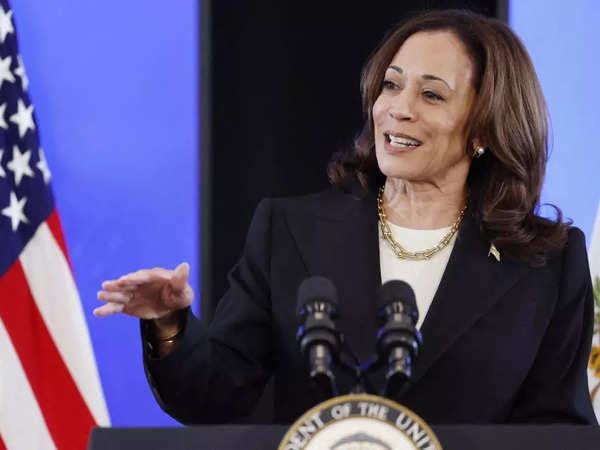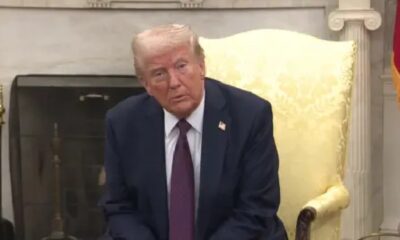Foreign
Trump bounces back on stage as VP Harris soar in poll

Donald Trump and Kamala Harris are holding dueling campaign stops in the crucial battleground state of Pennsylvania this weekend, as new polling shows the US vice president making major gains ahead of her big moment at next week’s Democratic National Convention.
Trump will hold a rally in the small town of Wilkes-Barre on Saturday, while Harris is taking her tour bus on several stops around Pittsburgh on Sunday before heading to the convention in Chicago.
The momentum in the White House race has shifted dramatically since President Joe Biden abruptly pulled out on July 21, with Harris’s whirlwind entry energizing the Democratic Party base.
A survey by the New York Times and Siena College published Saturday had Harris storming back into contention in four critical battleground states that Trump had looked set to win comfortably against Biden.
The Republican has struggled to find an effective counter to the Harris surge, and the new poll will likely trigger further consternation in his campaign team, with the vice president now ahead in Arizona and North Carolina, and getting closer in Nevada and Georgia.
The stakes will be high for Trump to find some fresh impetus at Saturday’s public rally, after a series of distinctly low-energy events held at his Florida resort home and a golf club he owns in New Jersey.
The Trump campaign’s statements have focused on issues like immigration and inflation, but the candidate himself has spent large chunks of recent speeches launching personal attacks against Harris, which may not play well with the undecided and independent voters he needs to win on November 5.
“Hard-working Americans are suffering because of the Harris-Biden administration’s dangerously liberal policies,” a campaign statement said ahead of the Wilkes-Barre rally.
“Prices are excruciatingly high, cost of living has soared, crime has skyrocketed, and illegal immigrants are pouring into our country,” it said, although a recent crackdown on the Mexico border has stemmed much of the flow of undocumented workers and asylum seekers.
Whether Trump can stay on that message is another matter.
Speaking to reporters on Thursday, Trump argued that he felt perfectly “entitled” to keep up his personal attacks on Harris — the first Black woman nominee of a major party in history.
His remarks have included questioning Harris’s intelligence, attacking her racial identity and branding her a “communist.”
With polls showing the head-to-head race very close, it is the swing states — especially Pennsylvania — that will decide the final result under the US electoral college system.
Trump lost the state by a narrow margin against Biden in 2020 but has strong support in rural areas and small towns.
A separate New York Times/Siena poll last week showed Harris narrowly ahead in Pennsylvania and the two other northern battleground states of Michigan and Wisconsin.
The vice president will be hoping to keep the poll momentum going as she heads into the Chicago convention, which will feature three days of speeches from party leaders, including Biden and former president Barack Obama.
Harris will round out the event on Thursday evening, with her own speech to formally accept the party nomination.
– Fight over economy –
With election day rapidly approaching, Harris is trying to distance herself from unpopular Biden policies, while getting ahead of Trump’s attempts to brand her a liberal extremist.
The past week has seen the two sides home in on voters’ worries about the economy.
Trump hammered Harris on Thursday, saying she has a “very strong communist lean” that would bring the “death of the American dream.”
On Friday, Harris held an event in North Carolina to unveil a series of proposals to ease the burden of post-Covid pandemic inflation.
She noted that the US economy was booming while conceding that “many Americans don’t yet feel that progress in their daily lives.”
“Donald Trump fights for billionaires and large corporations,” she said. “I will fight to give money back to working- and middle-class Americans.”
AFP
Foreign
US Supreme Court Allows Trump’s Ban On Trans Troops To Take Effect

A divided US Supreme Court on Tuesday allowed President Donald Trump’s ban on transgender military personnel to take effect while litigation plays out, putting thousands of troops at risk of dismissal.
The ruling — which the court’s three liberal justices opposed — is a significant victory for Trump, who has made rolling back transgender rights a major part of his second term in office, and has railed against judges who blocked parts of his agenda.
Lambda Legal and the Human Rights Campaign Foundation — which filed the lawsuit that had resulted in a lower court temporarily blocking the implementation of the ban — slammed the Supreme Court’s decision.
The ruling “is a devastating blow to transgender servicemembers who have demonstrated their capabilities and commitment to our nation’s defense,” the organizations said in a statement .
“Transgender individuals meet the same standards and demonstrate the same values as all who serve. We remain steadfast in our belief that this ban violates constitutional guarantees of equal protection and will ultimately be struck down,” they said.
White House Press Secretary Karoline Leavitt hailed the ruling as “another MASSIVE victory in the Supreme Court,” saying in a post on X that Trump and Pentagon chief Pete Hegseth “are restoring a military that is focused on readiness and lethality — not DEI or woke gender ideology.”
Hegseth meanwhile responded to the news with a post on his personal X account that said: “No More Trans @ DoD.”
In a January 27 executive order, Trump stated that “expressing a false ‘gender identity’ divergent from an individual’s sex cannot satisfy the rigorous standards necessary for military service.”
Shifting policies
The Pentagon followed that up with a memo issued in late February stating that it would remove transgender troops from the military unless they obtain a waiver on a case-by-case basis, as well as prevent transgender people from joining.
The Supreme Court’s decision to allow the ban to take effect means thousands of currently serving troops could be removed from the ranks.
The restrictions in the Pentagon memo are aimed at those who have been diagnosed with gender dysphoria — of whom there were 4,240 serving in the military as of late last year, according to a senior defense official — as well as those who have a history of the condition or exhibit symptoms of it.
Transgender Americans have faced a roller coaster of changing policies on military service in recent years, with Democratic administrations seeking to permit them to serve openly, while Trump has sought to keep them out of the ranks.
The US military lifted a ban on transgender troops in 2016, during Democrat Barack Obama’s second term as president.
Under that policy, trans troops already serving were permitted to do so openly, and transgender recruits were set to start being accepted by July 1, 2017.
But the first Trump administration postponed that date to 2018 before deciding to reverse the policy entirely.
Trump’s restrictions on transgender military service — which underwent changes in response to various legal challenges — eventually came into force in April 2019 following a protracted legal battle that went all the way to the nation’s top court.
His Democratic successor Joe Biden moved to reverse the restrictions just days after he took office in 2021, but Trump was reelected last year after making clear he would again seek to target transgender rights.
Transgender issues have roiled US politics in recent years, as states controlled by Democrats and Republicans have moved in opposite directions on policies ranging from medical treatment to what books on the topic are allowed in public or school libraries.
AFP
Foreign
2 Dead, Many Injured As Plane Crashes In USA

A small plane has crashed into a backyard of a residential neighbourhood in southern California, killing two people onboard and damaging homes, local authorities said.
The Ventura County Fire Department said firefighters received reports Saturday afternoon of a single-engine aircraft that had crashed into two houses in Simi Valley, northwest of Los Angeles.
Police and the medical examiner’s office “verified there were two passengers in the aircraft, both of whom were fatally injured in the accident,” the county fire department wrote on X.
The two homes were occupied at the time of the crash, but no injuries to residents were reported, the fire department said.
Photo and video images posted by the department showed firefighters on top of a house with holes in the roof, a fence and brick wall between residences knocked down, and the tops of trees sheared off.
The Simi Valley Police Department said officers had located the plane “in the backyard of a residence.”
Police told CBS News that the pilot, a passenger, and a dog were aboard when the plane crashed at around 2:00 pm.
The Federal Aviation Administration said, according to CBS, that the plane was a Van’s RV-10, which had taken off from William J. Fox Airfield in Los Angeles County and was heading to Camarillo Airport in neighbouring Ventura County.
In January, a Van’s RV-10, a small plane with four seats, crashed into a commercial building near Fullerton Municipal Airport southeast of Los Angeles, killing at least two people and injuring 18 others.
AFP
Foreign
Kamala Harris blasts Trump’s “chaotic” presidency, privatisation push

A former U.S. Vice President Kamala Harris has launched a critique of Donald Trump’s administration, accusing the former president and his allies of executing a decades-old conservative plan to reshape America through fear, division, and unchecked power.
Speaking on Wednesday in San Francisco at an event organized by Emerge; a political group dedicated to training Democratic women for public office, Harris delivered her first major address since her party’s defeat in the November election.
“What we are, in fact, witnessing is a high velocity event, where a vessel is being used for the swift implementation of an agenda that has been decades in the making,” Harris told the audience.
She argued that the chaotic and aggressive start to Trump’s presidency is not random but rather a calculated effort to serve a narrow group of elites.
“An agenda to slash public education. An agenda to shrink government and then privatize its services. All while giving tax breaks to the wealthiest,” she said.
Harris accused Trump’s administration of fostering a dangerous political climate.
She said, “A narrow, self-serving vision of America where they punish truth-tellers, favor loyalists, cash in on their power, and leave everyone to fend for themselves.”
Since taking office, Trump’s presidency has been defined by a flurry of executive orders, touching on immigration, foreign aid, and even everyday regulations such as water pressure in showerheads.
While his supporters have welcomed the rapid changes, critics warn the administration is bypassing democratic norms and institutions.
Recent opinion polls reflect growing public unease with Trump’s policies, particularly his shifting stance on tariffs and international trade, which have caused economic uncertainty.
Harris, who has largely kept a low profile since leaving Washington in January, used the platform to warn about the administration’s efforts to intimidate opposition voices.
“President Trump, his administration, and their allies are counting on the notion that fear can be contagious. They are counting on the notion that, if they can make some people afraid, it will have a chilling effect on others,” she said.
But she also struck a hopeful tone, saying resistance is growing across the country.
“Fear isn’t the only thing that’s contagious. Courage is contagious. The courage of all these Americans inspires me,” Harris told the crowd.
Though she has yet to confirm any future political ambitions, Harris is widely believed to be considering a run for governor of California in 2026 or even a White House bid in 2028.
Her forceful speech suggests she may be preparing to return to frontline politics, and positioning herself as a leading voice in the fight against Trump-era conservatism.
-

 News18 hours ago
News18 hours agoJust in: Finally, EFCC bows to pressure, releases VDM
-

 News24 hours ago
News24 hours agoJust in: Security and Exchange Commission declares PWAN as PONZI scheme, cautions Nigerians
-

 News22 hours ago
News22 hours agoJust in: Lagos LG chairman slumps during APC meeting
-

 Entertainment8 hours ago
Entertainment8 hours agoI’m broke yet accused of money laundering – VDM breaks silence after EFCC release
-

 News23 hours ago
News23 hours agoMultiple video evidence against Nnamdi Kanu
-

 News8 hours ago
News8 hours agoEdo police rescue kidnapped PDP chairman, 36 others
-

 News8 hours ago
News8 hours agoTomato Ebola Causes Loss of N1.3 Billion, Contributing to Rising Food Prices
-

 News8 hours ago
News8 hours agoSad! Five members of one family die of food poisoning


















